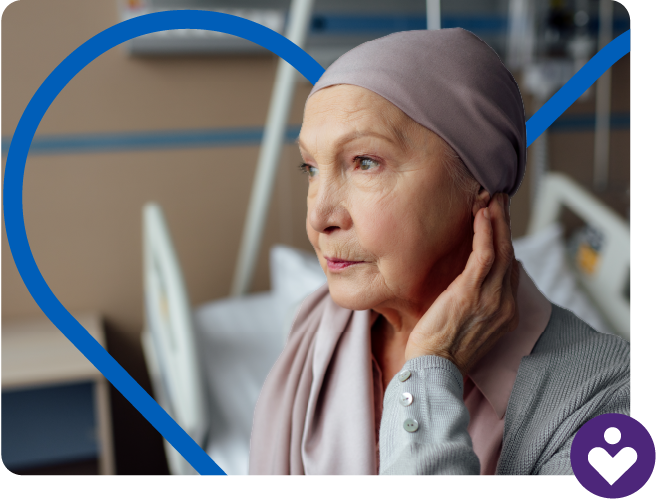Cancer can affect anyone, but some types of cancer are specific to the female body, including cervical, ovarian, vaginal, vulval and womb cancers. Breast cancer is the most common cancer in women in the UK, and 99% of breast cancer patients in the UK are women (Cancer Research UK).
Scroll down for more information or:

About cancer
Cut your cancer risk
The best way to try to avoid cancer is to live a healthy lifestyle. Research suggests that four in ten cancer cases can be prevented by healthy lifestyle choices (Cancer Research UK). Getting vaccinations and going to screening appointments can also reduce your cancer risk.
Six ways to cut your cancer risk
HPV
Screening
Depending on your age and risk, you may be invited to appointments where parts of your body will be checked for cancer. It’s important to attend these screenings when you’re invited, as they can help pick up symptoms early.
Easy read guides:
Genetic screening
Cancer is not usually inherited, but some types – mainly breast, ovarian, colorectal and prostate cancer – can be strongly influenced by genes and can run in families.
Talk to your doctor if cancer runs in your family and you’re worried you may get it too. They may refer you to a local genetics service for an NHS genetic test, which will tell you if you have inherited one of the cancer risk genes.
What are BRCA mutations?
Self-checks
See a doctor immediately if you notice:
How to check your breasts
For further information on breast health:
Period tracking
Abnormal vaginal bleeding and blood-stained discharge can be a sign of cancer. While most people with unusual bleeding won’t have cancer, tracking your period will help you spot any unusual symptoms if you need to talk to your doctor.
For further information on periods:
Your stories
LGBTQ+
How to live well
Cancer can have a long-lasting impact on every aspect of your life. Your medical team at the hospital and your doctor can work together to care for your needs and worries as they come up.
If you are affected by cancer, Cancer Matters Wessex has lots of information on local support and services, including:
This video from Dorset County Hospital and the Dorset Cancer Partnership provides health and wellbeing information for patients, relatives and carers, aimed at supporting you to make healthier lifestyle changes and improve your quality of life.
Prehabilitation
Prehabilitation or prehab means getting ready for cancer treatment in whatever time you have before it starts.
It covers:
Exercise, diet and healthy living with cancer
Physical activity can be an important part of your recovery after cancer treatment. During treatment, even just spending less time sitting down and taking short walks can help.
Being active has many benefits and can help to:
Being active at recommended levels and keeping to a healthy weight may reduce the risk of certain cancers coming back.
If you are not used to exercising or haven’t exercised for a while, you may worry you’re not going to be able to keep it going. Being active doesn’t mean you have to exercise intensely. To start with it can be as simple as going for short walks, doing things around the house or gardening.
Types of cancer
Breast cancer
Breast cancer forms in breast tissue. Breast tissue is not only in your breasts, it goes all the way up to your collarbone and under your armpit. Everyone has breast tissue – people of all ages, races and genders. If breast cancer is diagnosed early, it can often be treated successfully.
The best way to spot early signs of breast cancer is to attend routine and regular mammogram screening and to regularly check your breasts for changes.
Breast screening
Breast screening (mammogram) is an x-ray of your breasts that checks for cancers that are too small to see or feel. Anyone registered with an NHS doctor as female will be invited for breast screening every three years between the ages of 50 and 71.
You may get a referral for more tests or to see a specialist at a breast clinic if your doctor thinks you have symptoms that could be cancer. This does not definitely mean you have cancer.
For further information on breast screening, visit our page on prevention and protection:
Breast Cancer Now resources
Breast Cancer Now has released information packs for during and after breast cancer treatment.
Further resources
Cervical cancer
Your cervix connects your womb to your vagina. Anyone with a cervix can get cervical cancer. Though it can affect people of any age, it is most common between the ages of 30-34.
For further information on cervical screening, visit our page on prevention and protection:
Ovarian cancer
Vaginal cancer
Vaginal cancer is a very rare cancer that’s found anywhere in the vagina. Vaginal cancer is nearly always caused by an infection from certain types of the human papillomavirus (HPV). It is important that young people receive the vaccination that prevents this virus.
Vaginal cancer is often found and prevented by attending cervical screening, which aims to find and treat abnormalities before they turn into cancer.
For further information on HPV and cervical screening, visit our page on prevention and protection:
Vulval cancer
Womb cancer
Local services
Cancer services
You may need to attend hospital for tests and specialist appointments. Dorset has lots of cancer services, including specialist breast and gynaecology clinics.

